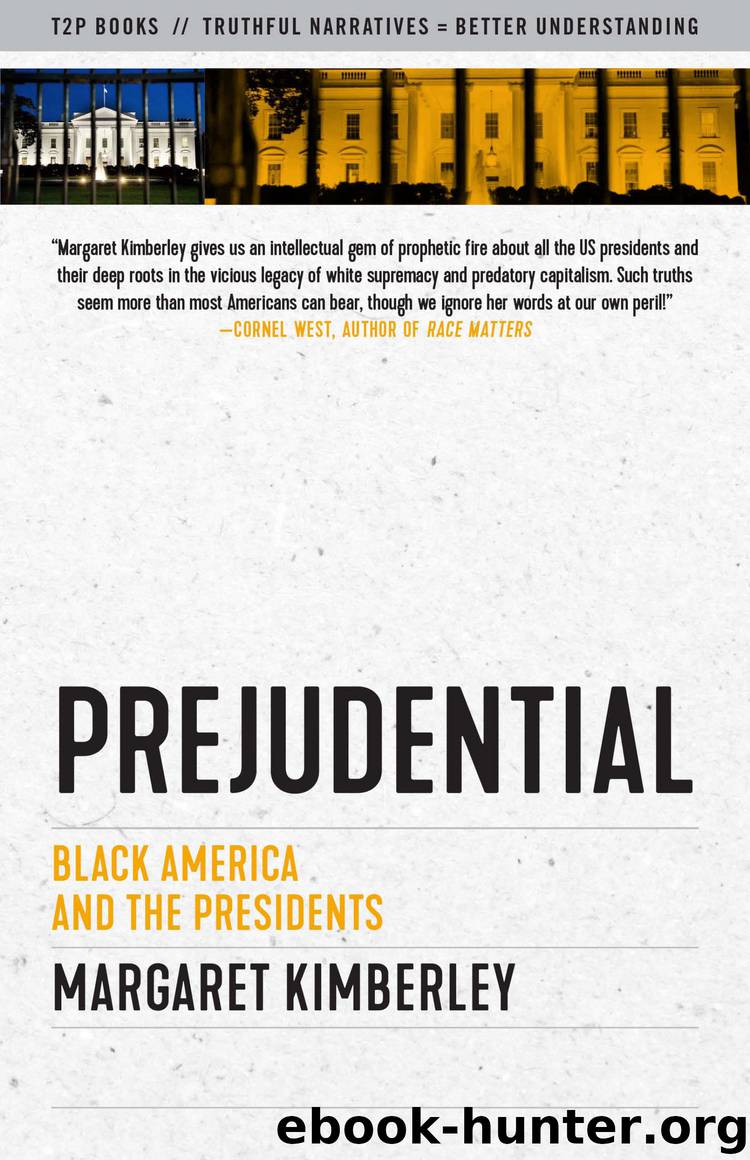Prejudential by Margaret Kimberley;

Author:Margaret Kimberley;
Language: eng
Format: epub
Publisher: Penguin Random House LLC (Publisher Services)
Published: 2020-02-03T16:00:00+00:00
– 29 –
WARREN G. HARDING
1921–1923
The trauma of the Wilson administration ended and new hope began after the return of the Republicans, the party of Lincoln, in the 1920 election of Warren G. Harding, governor of Ohio. Harding initially made all of the right noises. He met with James Weldon Johnson several times during the 1920 campaign. The party platform asked Congress “to consider the most effective means to end lynching in this country which continues to be a terrible blot on our American civilization.”1 On April 12, 1921, Harding condemned lynching in a special session of Congress, but he didn’t take any of the actions needed to make it become law. On October 26, 1921, Harding attended a fiftieth anniversary celebration of the founding of Birmingham, Alabama. Like every other Republican president who went on a grand southern tour he had a goal of winning over white voters, and he didn’t disappoint when he spoke against “social equality,” which was the great bugaboo of the day. But he stunned the white half of the integrated audience when he spoke of the patriotism of black soldiers and added, “Let the black man vote when he is fit to vote, prohibit the white man voting when he is unfit to vote.” The black audience cheered wildly when Harding added language about “equal educational opportunity.”
So desperate were black Americans for affirmation that Harding was praised despite his making it clear that he opposed the dreaded social equality and any amalgamation of the races. Du Bois responded to this never-ending shibboleth of racism: “It is the white race, roaming the world, that has left its trail of bastards and outraged women and then raised holy hands to heaven and deplored ‘race mixture.’ No, we are not demanding and do not want amalgamation, but the reasons are ours and not yours. It is not because we are unworthy of intermarriage — either physically or mentally or morally…we are abundantly satisfied with our own race and blood.”2
Republican Missouri congressman Leonidas Dyer sponsored the first of many anti-lynching bills in Congress. Dyer’s district was in St. Louis, and he was horrified by the mob attacks against his constituents and others in 1917. Republicans were willing to go on record in support of the bill but refused to fight and connived to get southern Democrats to take the blame for the bill’s failure, even though their determined inaction was equally at fault. James Weldon Johnson, executive director of the NAACP, wired Harding the day before the Senate vote but was informed of the bill’s failure by a White House staffer.
In 1922, W. E. B. Du Bois lamented, “May God write us down as asses if ever again we are found putting our trust in either the Republican or the Democratic Parties.”3 For his part Harding felt unappreciated for his meager efforts. “The Negroes are very hard to please. If they could have half of the Cabinet, seventy-five percent of the Bureau Chiefs, two-thirds of the Diplomatic appointments
Download
This site does not store any files on its server. We only index and link to content provided by other sites. Please contact the content providers to delete copyright contents if any and email us, we'll remove relevant links or contents immediately.
| Africa | Americas |
| Arctic & Antarctica | Asia |
| Australia & Oceania | Europe |
| Middle East | Russia |
| United States | World |
| Ancient Civilizations | Military |
| Historical Study & Educational Resources |
Stolen by Richard Bell(715)
My Vanishing Country by Bakari Sellers(642)
We Could Not Fail by Richard Paul(637)
Medical Apartheid: The Dark History of Medical Experimentation on Black Americans From Colonial Times to the Present by Harriet A. Washington(637)
The Broken Heart of America by Walter Johnson(626)
Bending Toward Justice : The Birmingham Church Bombing That Changed the Course of Civil Rights (9781250201454) by Jones Doug(583)
The New Negro by Jeffrey C. Stewart(576)
Overground Railroad by Candacy Taylor(573)
The End of White World Supremacy by Malcolm X(544)
Black Slaves, Indian Masters by Barbara Krauthamer(536)
Jackson, 1964: And Other Dispatches From Fifty Years of Reporting on Race in America by Calvin Trillin(495)
The Black Panthers by Bryan Shih(494)
The Broken Heart of America: St. Louis and the Violent History of the United States by Walter Johnson(494)
The Last Hero: A Life of Henry Aaron by Howard Bryant(489)
The Price for Their Pound of Flesh by Daina Ramey Berry(483)
African American History For Dummies by Ronda Racha Penrice(474)
The Birth of a Movement by Dick Lehr(446)
A Dreadful Deceit by Jacqueline Jones(434)
The autobiography of Malcolm X by Malcolm X; Alex Haley(432)
